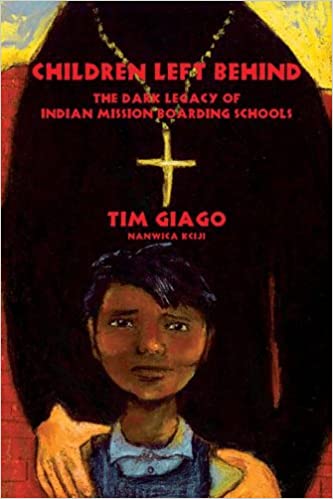Indian boarding school legislation comes up short

Children Left Behind: The Dark Legacy of Indian Mission Boarding (Photo Credit, Book cover art by Denise Giago)
PIERRE— In a nod to historical injustice, the South Dakota State House of Representatives passed a resolution on March 2 acknowledging and honoring the survivors of American Indian boarding schools.
House Concurrent Resolution 6014 was introduced and sponsored by State Rep. Peri Pourier, D-Pine Ridge, who is an enrolled member of the Oglala Sioux Tribe.
“This passage from the House of Representatives speaks volumes towards reconciliation,” Pourier told the Native Sun News Today. “The acknowledgement of the suffering and abuse while honoring survivors’ resiliency is long overdue.”
However, Native Sun News Today owner Tim Giago, author of the 2006 non-fiction Children Left Behind: The Dark Legacy of Indian Mission Boarding, objected.
“I want our legislators to rescind the law that prevents me and thousands of other former boarding school students from suing the schools where the abuse took place,” Giago immediately responded in a social media post.
“We would rather have that freedom than to be falsely honored,” he said.
Previously in 2019, the South Dakota House Judiciary Committee killed a bill that could have opened the window for survivors of childhood sexual abuse to pursue civil suits against entities, such as the Catholic Church, which ran the boarding school Giago was forced to attend.
One of the 2019 bill’s opponents was a lobbyist for the St. Joseph Indian School, which is affiliated with the Catholic church, arguing that schools that are currently doing good work for American Indian children and communities may be “bogged down” with civil actions against them, according to an article in the Rapid City Journal on Feb. 12, 2019.
As a granddaughter, I felt it was my duty to bring this issue forward,” said Rep. Pourier. “This is the first acknowledgment from the South Dakota State Legislature on this very difficult issue.” Her resolution was adopted on a vote of 52-17.
Boarding schools for American Indian children began in 1860 when Methodist missionary James Wilbur established a vocational Indian Boarding School on the Yakima Indian Reservation in the state of Washington as part of the Yakama Indian Agency.
Boarding schools are considered by many as the principal institution for colonizing Indigenous people. The first priority of boarding schools was to teach the fundamentals of European academic education such as reading, writing and speaking of the English language.
Christian religious training was taught with the end goal of replacing Indian culture with European values. The chief goal was embodied in the phrase, “Kill the Indian, Save the Man,” which is accredited to Brigadier General Richard Henry Pratt.
By the 1880s, the U.S. operated 60 schools for 6,200 Indian students, including reservation day schools and reservation boarding schools. The systematic round up of American Indian children in boarding schools went on through the 1960s.
Children attending the schools were stripped of all things associated with Native life, including speaking Native language, visiting and having contact with family, and growing long hair.
Physical and sexual abuse were pervasive at many schools, causing children to run away. Those who died in the process were buried in unmarked graves. Survivors live with the trauma endured in the schools, often managed by Christian denominations.
It wasn’t until the passing of the Indian Child Welfare Act in 1978 that American Indian parents gained the legal right to deny children’s placement in off-reservation schools.
Child removal is a global issue for Indigenous peoples, today. Australia’s “stolen generations,” for example, were “mixed-race” Indigenous children ripped from families with the aim of “breeding out the color.”
In 2007, Canada implemented the Indian Residential Schools Settlement Agreement in which the government formally apologized to former boarding-school students and paid reparations to survivors.
On Dec. 19, 2009, U.S. President Barack Obama signed the Native American Apology Resolution, apologizing for past “ill-conceived policies toward the Native peoples of this land.” Unfortunately, the resolution had no impact on federal policy toward Native Americans.
(Contact Darren Thompson at darrenjthompson@hotmail.com)
The post Indian boarding school legislation comes up short first appeared on Native Sun News Today.
